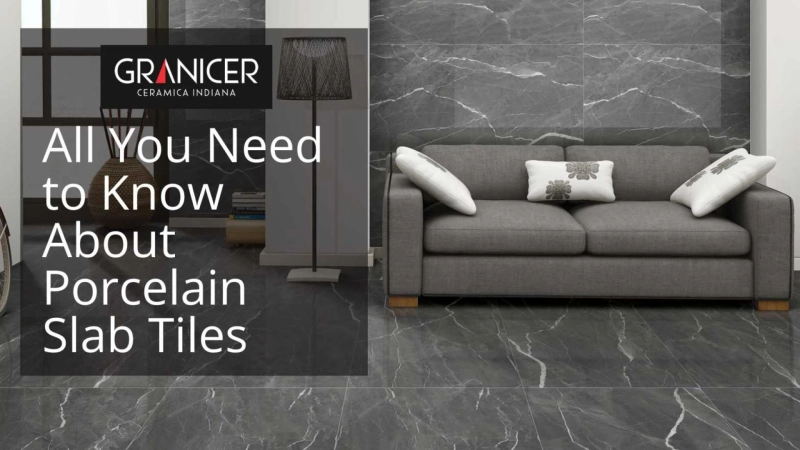Porcelain slab tiles, a staple in modern design, are renowned for their durability and versatility. These large-format tiles, suitable for various applications such as floors, walls, and countertops, are a top choice for residential and commercial projects.
Their resistance to moisture and stains and eco-friendly nature make them a standout option for any project. Using porcelain slab tiles can contribute to LEED certification, as they are often made from recycled materials and can be recycled at the end of their life.
This blog is a comprehensive guide to understanding porcelain slab tiles. We cover their pros and cons, cost, and available styles in detail. By the end, you\'ll have all the knowledge you need to confidently choose the best tiles for your renovation or new construction project.
What Is A Porcelain Slab Tile?
Porcelain slab tiles are large-format tiles made from refined clay, known for their durability and sleek design. These tiles are fired at high temperatures, resulting in a dense, hard surface that resists scratches, moisture, and stains.
The manufacturing process involves carefully selecting and refining the clay, shaping it into large slabs, and then firing them at high temperatures to create a dense, hard surface. This process, known as vitrification, ensures the tiles\' durability and resistance to various elements. The high firing temperature causes the clay particles to melt and fuse, creating a solid, non-porous surface highly resistant to water and stains.
In various finishes, porcelain slab tiles can mimic the look of stone, wood, or concrete, seamlessly integrating into diverse design styles. Their substantial size contributes to a contemporary, unified appearance with minimal grout lines, ideal for modern decor. Their resilience also makes them a preferred choice for areas where durability is key, such as bathrooms, kitchens, and commercial spaces.
What Are the Different Types of Porcelain Tiles?
Porcelain tiles are popular for their durability and versatility and come in various types and finishes. Each type has unique features, making them suitable for different applications and design styles.
Here are the main types of porcelain tiles:
- Glazed Porcelain Tiles
- Polished Porcelain tiles
- High Glossy Porcelain Tiles.
- Wooden Porcelain Tiles
- Satin Porcelain tiles
- Matt Porcelain tiles
This wide variety in finish ensures that porcelain tile flooring suits every design need, assuring you find the perfect fit for your project.
What Are the Benefits of Using Porcelain Tiles?
Porcelain tiles are popular for many applications and benefits. Here are a very few of them:
Extremely Durable and Long-Lasting
Porcelain offers impressive durability, lasting 15 to 50 years, depending on its rating. It\'s a reliable choice that outlasts most other ceramic tiles. Though not as durable as stone, it balances longevity and value well. This long-lasting quality ensures that your investment in porcelain tiles is a wise one, providing you with a beautiful and durable surface for years to come.
Easy to Maintain
Unlike stone tiles, porcelain tiles resist stains without needing a sealant. Maintenance is simple, with light sweeping or mopping, making them an excellent option for high-traffic areas or spaces prone to spills.
More Hygienic
Tiles offer a more hygienic alternative to carpeting and laminates. Unlike those materials, they don\'t trap dirt or absorb moisture, keeping your space cleaner. You can use household cleaning products without damaging the tile\'s surface.
Fireproof
Porcelain tiles are fire-resistant, meaning they won\'t catch fire or release toxic fumes during a blaze. This feature adds a layer of safety to your home, unlike carpeting and laminates, which can ignite and produce harmful smoke. The only other material with similar fireproof properties is stone.
Everlasting Designs
Direct sunlight won\'t cause porcelain tiles to fade, ensuring they maintain their vibrant colors for years. This makes them ideal for indoor and outdoor use, offering a consistent design that can withstand the elements. Unlike stone tiles, whose design runs through the entire material, porcelain provides a durable and stable surface.
Low Moisture Absorption Rate
With a moisture absorption rate of just 0.5%, porcelain is nearly waterproof. This characteristic makes it perfect for bathrooms, kitchens, and other wet environments. Its resistance to water damage helps prevent mold and mildew, ensuring a longer-lasting floor or wall covering.
Slip-resistant
Despite their smooth appearance, porcelain tiles can be made slip-resistant. Manufacturers add textured glaze or special coatings to reduce the risk of slipping, making them suitable for areas where safety concerns them. This feature is especially useful in bathrooms and around pools, where slip hazards are common.
Mimic Other Materials
Porcelain tiles can replicate the look of other materials, like wood or stone, offering a versatile design choice. These tiles can bring a rustic or luxurious appearance to a space without authentic wood or stone maintenance concerns. This flexibility allows for creative design without compromising durability or affordability. With porcelain tiles, you have the freedom to create a space that reflects your unique style and vision.
Ceramic Vs Porcelain: What is Best For Your Home?
Choosing the right tiles for your home involves weighing the benefits of ceramic and porcelain. Here\'s a breakdown to help you decide.
Ceramic Tiles
Ceramic tiles are generally less expensive and come in various colors and patterns. They offer a glossy finish but are more prone to chipping and scratching, making them best for low-traffic areas or decorative wall use.
Porcelain Tiles
Porcelain tiles are denser and more durable, with higher resistance to moisture, scratches, and stains. They offer both matte and glossy finishes. Although pricier, they are ideal for high-traffic areas and offer long-lasting quality with minimal maintenance.
If you\'re looking for affordability and are okay with lower durability, ceramic might be your best bet. However, if you need a long-lasting, durable option with a higher resistance to wear and moisture, porcelain tiles are the ideal choice. Consider the traffic, location, and budget when making your decision.
How Much Does Porcelain Slab Cost?
When considering porcelain slab tiles, it\'s helpful to get quotes from different suppliers to understand your budget. Costs vary based on factors like quality, size, and design. On average, porcelain slab tiles can range from [USD 10-20] per square foot. Larger slabs or those with unique patterns might be more expensive.
To get a rough estimate of your needs, measure the area to be tiled and include additional costs like grout and installation. The installation process for porcelain slab tiles can be more complex than for smaller tiles, and hiring a professional is often recommended. The tiles must be carefully laid out and aligned. The grout lines must be properly sealed to prevent moisture penetration. Having a clear idea of what you need can help you better manage your budget and avoid surprises during the project.
Is Porcelain Tiles Slippery When Wet?
Porcelain tiles can be slippery when wet, especially if they have a smooth or glossy finish. This is a concern in areas like bathrooms, kitchens, or entryways where moisture is common.
Choose porcelain tiles with a textured or matte finish to reduce the risk of slipping. These provide better traction. If safety is a concern, look for tiles specifically designed to be slip-resistant. These tiles have a higher coefficient of friction, making them less slippery when wet. Non-slip mats or rugs in high-risk areas can also help.
Reasons to Choose Porcelain Tile
Porcelain tile is a choice that brings a unique balance of practicality and aesthetic appeal to your home. Porcelain is worth considering if you aim for a sleek, polished look with lasting durability. It complements various design styles, seamlessly fitting into contemporary spaces and adding a touch of elegance to more traditional settings.
What makes porcelain stand out is its ability to deliver a clean and refined finish. With porcelain, you\'re not just choosing a tile; you\'re investing in a material that enhances the overall atmosphere of your space. Whether revising your bathroom, updating your kitchen, or reimagining your outdoor area, porcelain tile offers a refined solution that can transform any setting into a beautiful and functional environment.
Opting for porcelain tile is more than a design choice—a commitment to quality. It has the potential to elevate your home and create a lasting impression. So, if you\'re seeking a change in blending style with substance, porcelain tile might be what you\'re looking for.
Porcelain Slab Tiles – The Right Tile Choice for Your Home
When choosing tiles for your home, the right balance of functionality and aesthetics is crucial. Porcelain tiles stand out for their resilience and ability to resist stains. They are perfect for areas like kitchens and bathrooms with common spills and high traffic. They are durable and attractive options that complement various interior styles and can transform your home into a more comfortable and enjoyable space.
To get the best range and quality in Porcelain tiles, seek a reliable porcelain tile company to ensure high-quality products match your needs.


